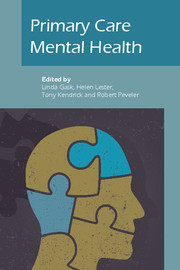Book contents
- Frontmatter
- Contents
- List of figures, tables and boxes
- List of contributors
- Preface
- Part I Conceptual basis and overarching themes
- Part II Clinical issues
- 8 Depression
- 9 Suicide and self-harm
- 10 Anxiety
- 11 Medically unexplained symptoms
- 12 Mental health problems in older people
- 13 Perinatal mental health
- 14 Child and adolescent mental health
- 15 Psychosis
- 16 Emergencies in primary care
- 17 Substance misuse
- 18 Management of alcohol problems
- 19 Eating disorders
- 20 Physical health of people with mental illness
- 21 Ethnic minorities
- 22 Asylum seekers and refugees
- 23 Sexual problems
- Part III Policy and practice
- Part IV Reflective practice
- Epilogue: Racing pigeons and rolling rocks: reflections on complex problems in primary care
- Index
17 - Substance misuse
from Part II - Clinical issues
Published online by Cambridge University Press: 02 January 2018
- Frontmatter
- Contents
- List of figures, tables and boxes
- List of contributors
- Preface
- Part I Conceptual basis and overarching themes
- Part II Clinical issues
- 8 Depression
- 9 Suicide and self-harm
- 10 Anxiety
- 11 Medically unexplained symptoms
- 12 Mental health problems in older people
- 13 Perinatal mental health
- 14 Child and adolescent mental health
- 15 Psychosis
- 16 Emergencies in primary care
- 17 Substance misuse
- 18 Management of alcohol problems
- 19 Eating disorders
- 20 Physical health of people with mental illness
- 21 Ethnic minorities
- 22 Asylum seekers and refugees
- 23 Sexual problems
- Part III Policy and practice
- Part IV Reflective practice
- Epilogue: Racing pigeons and rolling rocks: reflections on complex problems in primary care
- Index
Summary
Primary care is a significant point of contact for drug users who require treatment and many patients see this route of care as being readily accessible and less stigmatising than traditional specialist addiction services. Research shows that patients prefer care from a competent general practitioner (GP) rather than from other professionals.
In the UK, government policy has promoted GPs as an important facet of modern healthcare for these patients and, indeed, the past two decades are littered with policy documents, health service circulars and government strategies laying the foundations for effective primary care involvement in a primary-care-led National Health Service (NHS). To a large degree, GPs have responded to the challenge and collectively are undoubtedly the backbone of drug misuse treatment services, including the provision of substitute medication.
Who uses drugs and why
The use of illicit drugs, such as cocaine, heroin, ecstasy and cannabis, is prevalent in every part of society and across all socio-economic groups. Use of illicit substances is, in the most part, transient and part of the adolescent stage of development. The factors that predict why an individual goes from experimental to problematic use are complex and are the result of the interplay between social, environmental and individual factors (Box 17.1).
Box 17.1 Predictive factors for problematic drug use
• Age (peaks among people in their mid-20s)
• Gender (use is much higher among men than among women)
• School failure (high rates of truancy or exclusion among drug users)
• History of inconsistent parenting
• Poverty
• Drug use
Adapted from Bry (1996).
Drug misuse or drug use is not the same as dependence. Dependence is a specific psychological state in which drug use takes an overriding importance in people's lives and when they do not have the drug, they crave it. Dependence is characterised by (World Health Organization, 1992):
• compulsion to use
• difficulty in controlling use (e.g. alcohol dependence is characterised by an inability to moderate drinking)
• a withdrawal state on cessation of use
• evidence of tolerance (i.e. requiring increasing amounts of the drug to produce the same effect)
• progressive neglect of other activity because of substance use
• persisting with use despite evidence that use is becoming or has become harmful.
- Type
- Chapter
- Information
- Primary Care Mental Health , pp. 257 - 266Publisher: Royal College of PsychiatristsPrint publication year: 2009

